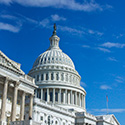July 2020

On July 7, AERA President Shaun Harper testified before the U.S. House of Representatives Subcommittee on Higher Education and Workforce Investment at a hearing titled “A Major Test: Examining the Impact of COVID-19 on the Future of Higher Education.” Harper is a Provost Professor in the Rossier School of Education and Marshall School of Business at the University of Southern California. He is also the founder and executive director of the USC Race and Equity Center.
The hearing was among several recent hearings that the House Education and Labor Committee has held to examine the impact of Covid-19 on educational institutions and racial inequities in education, health, and the workforce.
In his testimony, Harper outlined 10 recommendations that postsecondary institutions should consider for advancing racial equity when resuming instruction in the fall. Among the recommendations: institutions should consider the racial stratification of the workforce, specify ways to avoid even more significant employment inequities by race, and include faculty development activities to upskill faculty members for teaching students of color online.
Harper noted that these are not the only equity implications to be considered when reopening college and university campuses. He urged federal and state policymakers to continue to pay attention to other coronavirus-related racial inequities.
“Congress and higher education stakeholders should also continually engage students, faculty, and staff members of color to pursue additional insights into coronavirus-related threats to racial equity,” Harper said. “Negligence in doing so will result in the emergence of new disparities and the amplification of racial inequities that Covid-19 has already produced.”
Harper also responded to questions from subcommittee members. In answering a question from subcommittee chair Rep. Susan Davis (D-CA) on the importance of the federal role in higher education given state revenue losses, he said, “For one, we will see tremendous unevenness across states in postsecondary education. But, secondly, and most importantly, higher education is a public good that benefits the entirety of our nation and our nation’s position in the global economy.”
Harper also responded to questions raised by Rep. Joe Courtney (D-CT) on the importance of international students; Rep. Mark Takano (D-CA) on the lessons learned from the Great Recession; Rep. Suzanne Bonamici (D-OR) on addressing students’ non-tuition expenses; and Rep. Alma Adams (D-NC) on the impacts of state budget cuts on historically black colleges and universities, minority-serving institutions, and tribal colleges.
In answering Rep. Takano’s question, Harper said, “Taking a largely raceless-lens approach to correcting longstanding inequities is only going to, at best, sustain those inequities, but perhaps even exacerbate them.”
Harper continued, “We have to bring a race-forward, race-salient lens to thinking about Covid-19 recovery, because the truth is we have way too much evidence to confirm that Covid-19 has had a racially disproportionate impact on communities of color.”
Joining Harper were Sharon J. Pierce, president of Minneapolis College; Scott Pulsipher, president of Western Governors University; and Timothy P. White, chancellor of California State University.